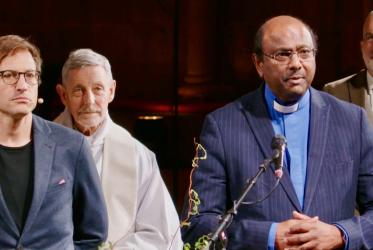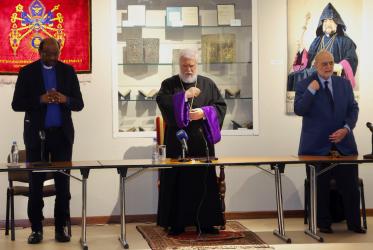“We should be learning from our mistakes, and exposing the systems that are not performing well,” says Pauliina Parhiala, director and chief operating officer of the ACT Alliance, a coalition of 137 churches and faith-based organizations serving internationally in humanitarian, advocacy and development work.
“There are 60 million people displaced worldwide,” she continues, “This is a fact that needs to be addressed globally. It is a matter for governments, but also for civil society including faith-based organizations.”
Parhiala is one of many participants in an 18-19 January conference on the European refugee crisis who are continuing to speak out and work for closer cooperation among states, international bodies and civil society in responding to pressing needs. The high-level international conference in Geneva was co-sponsored by the World Council of Churches (WCC) and three United Nations agencies (UNICEF, UNHCR, UNFPA).
“We need to share the best practices of humanitarian agencies,” says Parhiala. “And we need to arrange for discussions in which we hear clearly and directly the voice of refugees themselves.”
Rev. Dr Heinrich Bedford-Strohm, a systematic theologian, Lutheran bishop and council president of the Protestant Church in Germany (EKD), is another conference participant who shared his thoughts at the close of the conference.
“In a world characterized by polarization,” he told the meeting, “my hope is that we will discern certain ways we can go, based on our strengths. We want safe migration. There were 5,113 migrants who died in 2015. We must work to change the public perception of migrants and to dismantle the structures of illegal, dangerous migration.”
Nicholas Grisewood from the crisis migration office of the International Labour Organization argues for closer links among churches, the trade union movement, governments and the United Nations – and for closer links among the different UN agencies. In a presentation at the conference, he called for greater policy coherence among international actors, envisioning the refugee crisis at all points of migration from countries of origin to receiving communities.
“We must accelerate labour market integration efforts and activities,” he stresses. “This includes paying attention to education and especially training in language and culture. All of this takes time and significant resources.”
To be realistic in ensuring a better quality of life, he says, sheltering and receiving nations should place arriving refugees where jobs are available – not merely where cheap housing is available.
“We need to develop employment-rich responses in frontline, transitional and destination countries,” continues Grisewood. “Migration is a mega-trend of the 21st century, so we need to reinforce governance and better coordinate all actors at all levels. We have begun to think in these terms with the UN’s adoption of the new Sustainable Development Goals.” Active support of the relevant “SDGs” is a promising strategy in finding the way forward.
In another presentation at the WCC/UN conference, Xavier Creach put forward one possible model for cooperation among agencies. Creach works in the bureau for Europe of the United Nations High Commission for Refugees (UNHCR). He brought a proposal for “children and family support hubs” at all key transit points throughout the journey, where a variety of groups and agencies could share space while providing predictable services and information.
“These support hubs,” he says, “will provide at least a minimal set of services in close proximity under one familiar logo.” Among the services available could be family reunification networking, a child-friendly space, psychological counselling and medical aid, places of meditation, legal counselling and access to basic supplies.
The closing call of the January conference observed: “Civil society, including faith-based organizations, has a unique and substantial role in responding to humanitarian crises. Better coordination of their actions with those of governments and international agencies, as well as stronger inter-religious cooperation that brings in the voices and capabilities of other faiths, are essential to maximize efforts at ensuring the survival, rights and dignity of refugees and migrants.”
To these ends, the co-sponsors of the refugee conference have pledged to continue to meet “on a quarterly basis to review and share progress“ as they strengthen their common response.
More information on WCC work on migration (including conference documentation)
WCC/UN conference calls for coordinated action on refugee crisis (WCC press release of 20 January)




